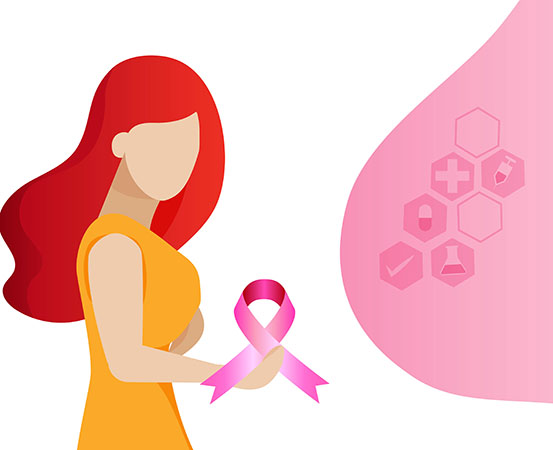
A recent study conducted by researchers from Canada and the UK has identified new genes associated with breast cancer. The collaborative study, published recently in the international scientific journal Nature Genetics, throws light on the role of new breast cancer genes. In the years to come, these genes could be included in the tests for identifying women at risk of breast cancer.
Breast cancer is the leading cause of cancer-related mortality for women worldwide. Hence, scientists looked into genetic variants other than the known ones that can potentially cause cancer. Researchers working on cancer and genetics noted that currently, the genetic mutations in a few genes, including BRCA1, BRCA2, and PALB2 are known to cause breast cancer. Together, these variants explain less than half the familial relative risk (FRR) of breast cancer. “The contribution of rare coding variants in other genes remains largely unknown,” highlighted the researchers while explaining why they took up the study to identify more genes contributing to breast cancer.
Breast cancer and family history
“When we talk about hereditary breast cancer and family history, there will always be some genetic mutations we are aware of and some, which are still unknown. So far, we know about the standard genes, such as BRCA1 and BRCA2, which are well studied and the incidences are much higher. As research continues, we will probably find more new genes that contribute to hereditary breast cancer, as seen in this study. In the other genes, the incidences are very low. Appropriate screening technique to analyze these genes in those with hereditary breast cancer is yet to be done,” says Dr Uma Dangi, consultant, medical oncology, Fortis Hospital, Mulund & Hiranandani Hospital, Vashi, Mumbai.
More breast cancer genes found
The press release showcases that the study found evidence for at least four new breast cancer risk genes, with suggestive evidence for many others. “The identification of these new genes will contribute to our understanding of the genetic risk of breast cancer. This knowledge will help improve risk prediction by better identifying those women at higher risk of the disease. It will better inform approaches to breast screening, risk reduction and clinical management,” the researchers said.
The discovery of these novel genes also provides crucial information on the biological mechanisms underlying cancer development, potentially opening the way to identifying new treatments.
Understanding the significance of the study
“Although most of the variants identified in these new genes are rare, the risks can be significant for women who carry them. For example, alterations in one of the new genes, MAP3K1, appear to give rise to a particularly high risk of breast cancer,” adds Professor Simard, a researcher at the Genomics Center of the CHU de Québec-Université Laval Research Center, who spearheaded the study. “To our knowledge, this is the largest study of its kind. It was made possible through the use of data from multiple collaborators in many countries, as well as publicly available data from the UK Biobank,” says Professor Douglas Easton, Director of the Centre for Cancer Genetic Epidemiology of the University of Cambridge.
The aim is to integrate this information into a comprehensive risk prediction tool currently used worldwide by health professionals. “Improving genetic counseling for high-risk women will promote shared decision-making regarding risk reduction strategies, screening and determination of treatment options,” emphasizes Professor Simard.
Responding to the study, Suruchi Aggarwal, PhD, Lead Scientific Affairs and Technical Support – Oncology, MedGenome, Bengaluru, said that breast cancer is known to have a genetic component, and mutations in specific genes can increase the risk of developing the disease. Aggarwal adds that by examining the coding regions of genes using exome sequencing (investigating the protein-coding regions of the genome), researchers can pinpoint variations that might be linked to an increased risk of breast cancer. “The results of such a study could provide valuable insights into the genetic factors underlying breast cancer and could potentially lead to improved risk assessment, early detection, and treatment strategies,” she said.
Agreeing with her, Dr Dangi says that the clinical significance of the study depends on the mutations to be seen in the large population.
Decoding cancer and genetics
Dr Dangi adds that the overall contribution of all the newly found genes in breast cancer is estimated to be smaller compared to that of genetic mutations we are aware of. “At present, we are how it is going to span out in terms of the tests and early screening of breast cancer. The findings of the study need to be correlated with the incidences. The gene penetrance or how many who undergo a specific gene mutation show symptoms of a disease, needs to be extensively studied before we come to the conclusion on how to screen women with a family history of breast cancer to the new genes,” she explains.
Aggarwal adds that, however, validation with larger datasets is inevitable before drawing conclusions on the clinical importance of variant sets in the risk of development or etiology of the disease.
Takeaways
- Breast cancer is one of the most common types of cancer in women. The genetic mutations triggering cancer — some known and many unknown — have been a matter of concern.
- Recent research on cancer and genetics reveals at least four new genes associated with breast cancer risk. The study looked into the genetic changes in all genes in 26,000 women with breast cancer and 217,000 women without breast cancer.

















